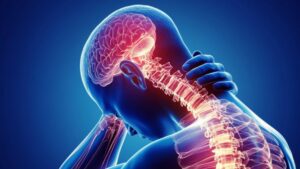

View Topics

Cancer treatment saves lives, but it can come at a steep cost. Chemotherapy-induced peripheral neuropathy (CIPN) affects nearly 70% of patients receiving certain drugs, creating a ripple effect that extends far beyond the infusion chair. Nerve damage manifests as tingling, burning, and numbness — sensations that transform routine tasks into formidable challenges. Hands that once…

Trigeminal neuralgia vs. TMJ: two very different conditions that can be frustrating to distinguish. Facial pain can strike suddenly, leaving you unsure of its origin. One moment, it’s a lightning-bolt stab across your cheek; the next, it’s a dull ache when you chew or yawn. Trigeminal neuralgia comes from an irritated nerve – the fifth…

Some patients experience partial migraines or headaches that they may attribute to weather sensitivity, increased workload, or general fatigue that builds up over long days without rest. Without treatment, the problem can worsen significantly. Patients typically report that the pain begins on one side of the neck or at the base of the skull and…

Tremors affect millions of Americans, causing involuntary shaking that can significantly impact daily life. Whether it’s difficulty holding a coffee cup, trouble with handwriting, or challenges with eating, these rhythmic movements can be both frustrating and concerning. Understanding the distinction between essential tremor vs. Parkinson’s is crucial for getting the right diagnosis and treatment plan….

Women’s neurology is a specialized field that focuses on the unique aspects of neurological health in women, acknowledging that hormonal fluctuations significantly impact brain function and susceptibility to certain conditions. Hormones such as estrogen and progesterone influence neurotransmitter activity, vascular function, and pain pathways, directly affecting cognition, mood, and headache patterns. Many women experience headaches,…

Long COVID, also known as post-acute sequelae of SARS-CoV-2 infection (PASC), is characterized by persistent symptoms extending beyond the acute phase of COVID-19. This condition affects up to 30% of survivors, including those who experienced only mild initial illness. The nervous system is particularly vulnerable, with neurological complications reported in 10-20% of cases. SARS-CoV-2 can…

Diabetes is a serious condition that can lead to permanent damage and many complications. Over time, nerve damage affects up to 50% of people with diabetes. This condition, called diabetic neuropathy, happens when blood sugar stays high for too long. It mainly affects the feet and hands. Symptoms include numbness, tingling, burning pain, foot ulcers,…

Teleneurology delivers neurological care through secure digital platforms via video calls, phone, or messaging. Neurologists treat strokes, epilepsy, migraines, and Parkinson’s remotely — no travel required. During teleneurology visits, doctors review symptoms, observe movements, test reflexes, and order scans. Results arrive quickly, and prescriptions are sent electronically. This service is rapidly growing in popularity. Rural…

A second stroke can be more disabling than the first, but prevention is possible with the right plan. Every small step matters — what you eat, how active you stay, and how closely you follow medical advice. Lifestyle changes include eating heart-healthy foods, staying active, and quitting smoking. They help protect blood vessels and improve…

Neuropathy is a condition that affects the peripheral nerves, which connect the brain and spinal cord to the rest of the body. When these nerves become damaged, they can no longer transmit signals for movement, sensation, and bodily functions properly. This damage often causes numbness, tingling, burning pain, or weakness, particularly in the hands and…